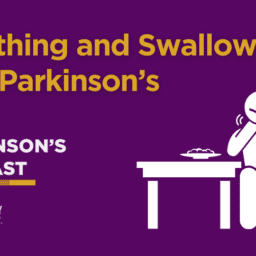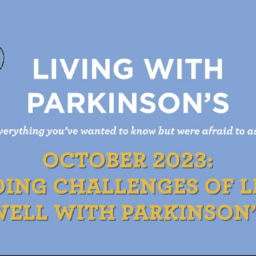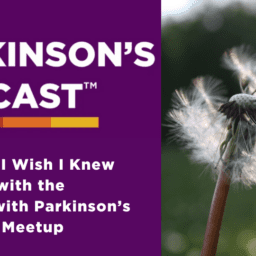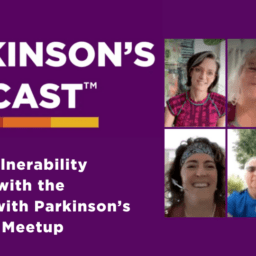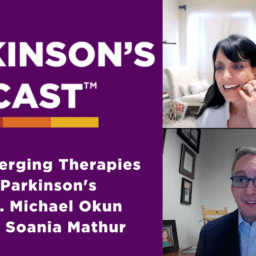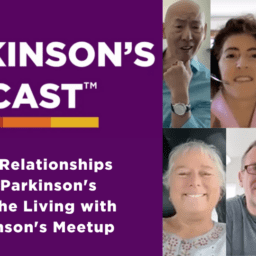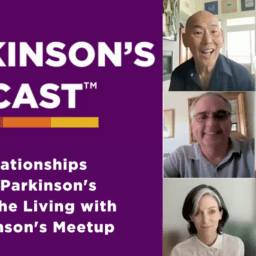Approximately 50-60% of people living with Parkinson’s experience varying levels of depression and anxiety. It’s important to know the difference between these common mood disorders so you can accurately explain how you’re feeling to your doctor and get the care you need.
In this episode
Roseanne Dobkin, PhD, discusses depression, anxiety, and apathy; the causes and treatments of them; and much more.
To download the transcript, click here.
Note: This isn’t a perfect transcript, but it’s close.
SHOW NOTES
- All people experience a range of emotions that shift, intensify, and ebb due to changing circumstances and life events. When negative emotions like despair, fear, and sadness persist and cause tremendous distress, however, it’s important to seek help
- Depression, anxiety, and apathy are common non-motor symptoms of Parkinson’s, but they all have unique characteristics
- Depression is defined by sadness, a lack of interest doing things you once enjoyed, feeling helpless, and feeling hopeless about the future
- Anxiety, on the other hand, is defined by excessive worry. It can include physical symptoms such as tension, restlessness, racing heart, and sweating, and it often leads to feelings of fear
- Apathy is a lack of interest for no emotionally driven reason. Whereas a person with depression might avoid experiences due to sadness and a person with anxiety may avoid experiences due to fear, a person experiencing apathy may avoid experiences because they simply have no interest
- It is never too late to seek treatment for mood-related symptoms. Depression and anxiety can be among the most important to address, because when an individual feels depressed or anxious, they may not have the ability to take the actions necessary to living well, including proper nutrition, exercise, and socialization
- Medications that treat depression are categorizes in classes, including SSRIs and SNRIs (such as Prozac, Zoloft, Lexapro, Effexor, Cymbalta) and Tricyclics (such as Nortriptyline)
- Cognitive Behavioral Therapy is a non-pharmaceutical treatment option and involves addressing negative self-talk, focusing on the here and now, and goal setting, among many other things
- Lifestyle choices, including incorporating regular exercise and proper nutrition (in particular, consuming plenty of vegetables, incorporating probiotics, and limiting refined sugars and carbs) can have a significant impact on improving your mood. Both high-intensity exercise such as boxing or running and low-intensity exercise such as yoga or walking have been shown to have benefits
- If you’re seeking a mental health specialist, Dr. Dobkin suggests you:
- Ask for a personal recommendation from your physician
- Search through online directories that allow you to choose a mental health professional based on areas of expertise. A few directories that can help: Psychology Today, the American Psychological Association (APA), and the Association for Behavioral and Cognitive Therapies (ABCT)
- Each state will also likely have a Psychological Association, which should be easily searchable using online search engines
- Know that although many mental health professionals may not have expertise in Parkinson’s, many are interested and willing to learn, so be proactive in providing them resources and information on the intricacies of Parkinson’s. If they are unwilling to learn, don’t hesitate to seek new care
RESOURCES MENTIONED
The Victory Summit® Virtual Event: Mental Health and Wellness
Finding a Movement Disorder Specialist
Plant-Based Diet for Parkinson’s
Exercise to Live Well with Parkinson’s
Help for OCD – The Association for Behavioral and Cognitive Therapies
More about your speaker
Dr. Roseanne Dobkin a licensed psychologist with a well-established clinical research program in Parkinson’s mental health. The overarching goal of her research program is to help people with Parkinson’s and their family members cope as effectively as possible with various challenges in order to enhance overall physical and emotional health and quality of life.
Her research and clinical work over the past 15 years has focused on the development and testing of non-pharmacological management approaches for the cognitive and psychiatric complications of Parkinson’s, such as depression and anxiety. She has also systematically explored the interactions between physical and mental health in Parkinson’s, and the impact of their intricate associations on quality of life and functional disability. Moreover, she has begun to systematically examine barriers to mental health care utilization in Parkinson’s, the use of telemedicine to leverage access to specialized mental health care in Parkinson’s and the impact of successful depression treatment on key outcomes such as cognition, physical disability, quality of life and caregiver health.
Live Well Today Webinar Series Presenting Partners*

*While the generous support of our sponsors makes our educational programs available, their donations do not influence Davis Phinney Foundation content, perspective, or speaker selection.
Thanks for Listening!
To share your thoughts:
- Leave a note in the comment section below.
- Ask a question by emailing us here.
- Share this show on Facebook.
To help out the show:
- Leave an honest review on iTunes. Your ratings and reviews really help, and we read each one.
- Subscribe on iTunes.
Listen & Subscribe
Apple Podcasts | Stitcher
*The Third Season of the Parkinson’s Podcast is made possible through generous support in honor of Dr. Margaret Hilgartner.




